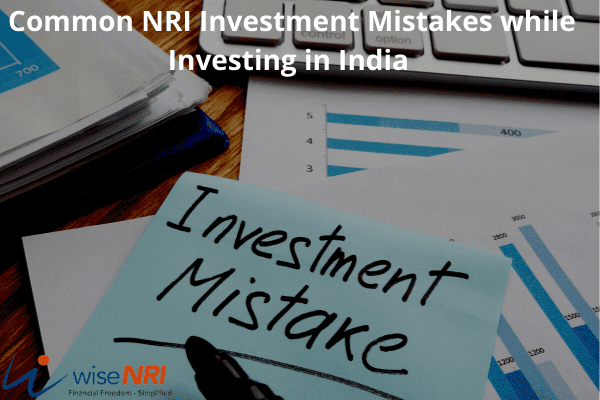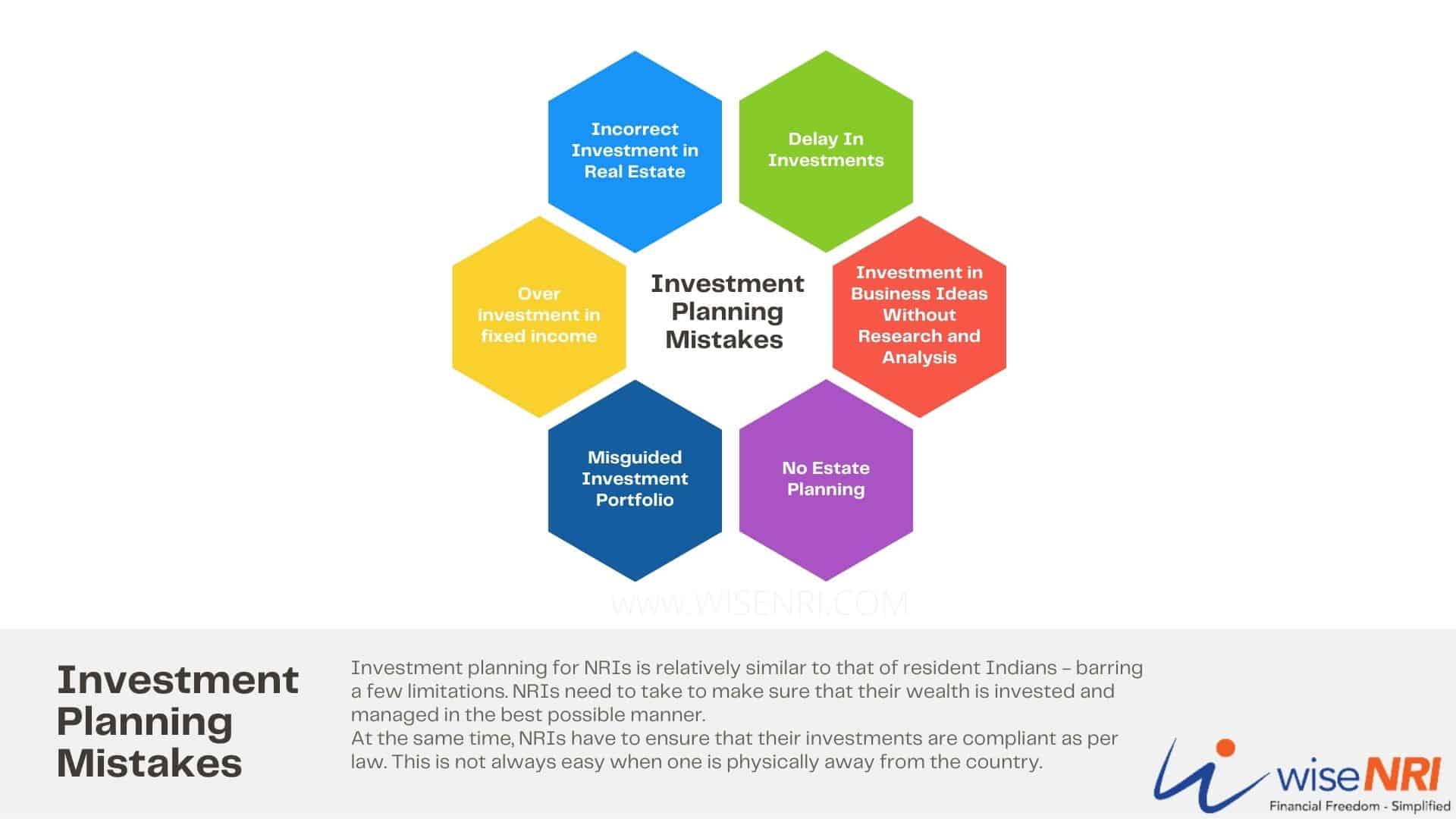Investment planning for NRIs is relatively similar to that of resident Indians – barring a few limitations. NRIs need to take to make sure that their wealth is invested and managed in the best possible manner.
At the same time, NRIs have to ensure that their investments are compliant as per law. This is not always easy when one is physically away from the country.

Must Read – NRIs plan to increase investments in India
NRI Investment Mistakes while Investing in India
Here are some typical but grave errors that NRIs might make. Stay away from these sins to have a solid investment plan.
1. Incorrect Investment in Real Estate
NRIs typically make the investment in real estate for asset building, emotional reasons, or for living in India in the future. But many of them do not evaluate the factors involved thoroughly.
The NRI should consider the following factors before investing in real estate –
- Return to India – A fair idea of when he will return for good. If he is going to return after ten years, it might make sense to buy the property later as a lot of things can change in the housing industry and personal and financial life as well.
- Location of the house – The NRI has to factor in things like who will live in the house and what is a convenient location for the NRI. Would they like to be near family and friends? Do they want to spend their retirement years near the beach? If they are going to live alone, it might be better to choose a location where all amenities such as markets and medical care facilities are available. Check: Best Places to retire in India.
- Allocation size in an investment portfolio – NRIs can own residential and commercial properties. NRIs usually have higher liquidity and tend to invest it in real estate. For example, the current real estate market is not attractive from an investment perspective in Tier 1 cities, it may not be a great idea to invest a large amount in real estate. If the NRI is planning to return to India for good, it is a different matter. He can consider buying a house such that it is equivalent to the proposed allocation for it in the investment portfolio.
2. Delay In Investments
There is a lot of documentation involved in investing in India. Moreover, the rules and compliance requirements change often which means one has to constantly update the relevant information. It is not always easy to manage these aspects when one is abroad.
So many NRIs decide to invest after they return to India. This would lead to opportunity loss in multiple ways. The NRI will lose the chance of creating wealth and earning returns from investment instruments. The later one invests, the lesser one earns. The power of compounding works best when one invests as early as possible and for as long as possible.

Must Read – Should NRIs Rent Their House?
Moreover, India is a developing country with a lot of potential for investment growth. The NRI should make an effort to manage investments when he visits India. He can ask well-intentioned friends and relatives to manage investment documentation.
He can enlist the services of a financial planner who will manage his investment portfolio and take care of all mundane tasks and also update him with actions to be taken.
3. Investment in Business Ideas Without Research and Analysis
NRIs also have a feeling that they are missing out on opportunities in India. Some NRIs get enamored by stories of how Indians living abroad make money in profitable ventures back home. They do not delve deep into the stories to find out how true it is. Others want to implement their dream ventures that may not be feasible in India. Some others pick up ideas from their country of residence and execute them in India.
The Indian market might be different in terms of product acceptance, the real requirement for the product/service, demographics, culture, price sensitivity, etc. Market conditions also change rapidly.
Since the NRI cannot spend time and effort, he outsources it to business partners, friends, or relatives who may or may not have his best interests at heart. If the business is unsuccessful, relationships can go bitter as well. This results in loss of money, disillusionment, and estranged relations.
As an NRI, invest in businesses promoted by local players who understand the business better than you. Do not invest a huge sum of money in one venture. You can spread your investment in multiple projects.
If you are starting a business in India, do a feasibility study and market study. Plan and then execute the operational work. Incorporate risk management. Employ the right people with the right skills and credentials to work with you. You can partner with a consulting firm when you start a venture.
Do not get swayed by emotions and ideas that seem highly profitable. Do the groundwork. Look at hard facts and evaluate the information given to you from all aspects and then make a well-balanced investment decision.

Check – NRIs invest in stocks in India?
4.No Estate Planning
Estate planning is not among the favorite activities of most NRIs. But the future is unpredictable and it is important to secure your financial matters as much as possible. An estate plan documents how you want your assets to be distributed and how your financial affairs are to be handled once you have passed away.
NRIs would have created wealth in multiple countries. There can be issues like improper transfer of assets and lack of awareness of all assets etc. Therefore, it is imperative that the NRI draws up a will so that he will know what assets he has and the amount of wealth he has generated. The inheritance process can be smooth without ugly incidents.
“Estate planning allows for a smooth transfer of your assets in case of ill-health, incapacitation, or death and protects you, your loved ones, and your assets.” wiseNRI
Check – Is it a good time for an NRI to buy a property in India?
5. Misguided Investment Portfolio
NRIs are in India for a short period of time. They also cram a lot of things on that visit and therefore have less time to plan their investments properly. Therefore they rely on others to do the groundwork for them. They ask friends and relatives for investment advice. This advice can be biased in various ways. Even if the advice is sound, it may not work for the NRI as his financial status and personal circumstances are different from the “advisor”.
In other cases, when the NRI visits his bank, the relationship manager or other bank employees push products that suit their purposes. He ends up investing in products not suited to his investment portfolio. An NRI must stay away from such investment traps.
Instead, he should research and evaluate his financial needs and objectives and then select appropriate investment instruments. He can work with a professional financial planner who has the relevant experience and expertise in handling NRI investment portfolios. The financial planner will give unbiased advice and create a financial plan that will have the potential to create wealth and generate optimum returns. The financial planner can also manage the plan on a regular basis and make requisite changes.
Read – 7 things banker wishes NRI’s don’t know about Financial Planning
6. Over investment in fixed income
Fixed income instruments are considered to be safe investments as returns are less volatile as compared to other investments such as equity. But fixed-income investments do have risks. Inflation & currency dilutes the real value of these assets.
Many fixed-income assets are illiquid in nature which means you cannot easily use them in times of emergency or you have to pay a price to use them.
There is an inbuilt interest risk. When interest rates rise, the price of bonds falls which means your investments lose value.
Fixed income instruments are debt instruments. When you invest in them, you expose yourself to the risk of default. As we saw in the DHFL crisis, there is the possibility of non-payment of interest or capital in case of dire situations.
NRIs should, therefore, have a diversified investment portfolio so that you can handle financial volatility and financial contingencies.
NRIs usually have a significant amount of wealth. They should be careful while managing their investments so that they do not make costly mistakes. NRIs should develop a comprehensive investment plan based on their financial goals, financial status, tax implications, and risk tolerance levels.
Please share if you are aware of some more common NRI Investment mistakes done by most of the NRIs.
